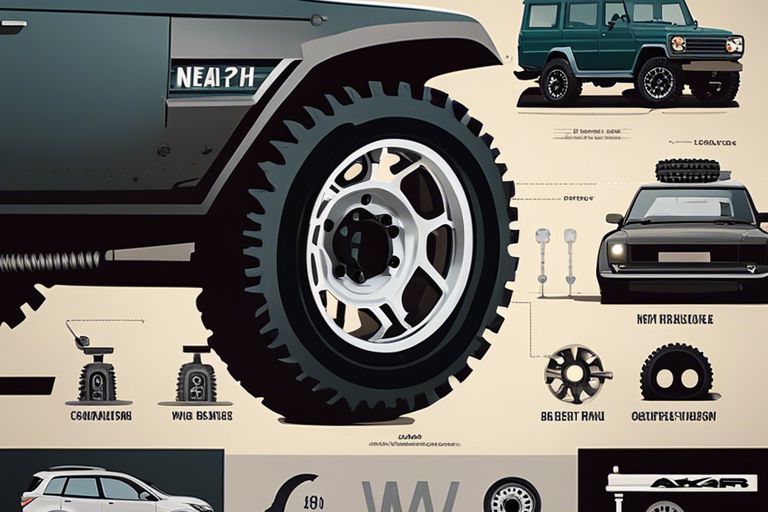Over rocky terrain and rugged landscapes, having the right towing hitch for your off-road adventures is crucial. Your safety and the protection of your vehicle depend on it. In this blog post, we will guide you through everything you need to know about choosing the best off-road towing hitch for your vehicle. From features to consider to installation tips, we’ve got you covered for a smooth and secure off-road towing experience.
What is an Off Road Towing Hitch?
Definition and Purpose
For off-road enthusiasts, an off-road towing hitch is a crucial accessory that allows you to tow trailers, boats, or other heavy loads through rugged terrain. Unlike regular towing hitches, off-road towing hitches are specifically designed to withstand the demands of uneven and challenging surfaces, providing you with the stability and durability needed for off-road adventures.
Types of Off Road Towing Hitches
For off-road vehicles, there are different types of off-road towing hitches available to suit your specific needs. The most common types include the receiver hitch, bumper hitch, gooseneck hitch, fifth wheel hitch, and pintle hitch. Each type has its own set of advantages and is suitable for different off-road towing situations. Recognizing the right type of hitch for your vehicle and towing requirements is crucial for a safe and successful off-road journey.
| Receiver Hitch | Bumper Hitch |
| Gooseneck Hitch | Fifth Wheel Hitch |
| Pintle Hitch |
In terms of choosing the right off-road towing hitch, you must consider factors such as the weight of the load you will be towing, the type of terrain you will be traversing, and the capabilities of your off-road vehicle. Each type of hitch offers different features and benefits, so it’s important to select the one that best suits your needs. Recognizing which off-road hitch is compatible with your vehicle and provides the necessary strength and stability is crucial for a safe and successful off-road towing experience.
Benefits of Using an Off Road Towing Hitch
Increased Towing Capacity
Clearly, when you opt for an off-road towing hitch, you are investing in increased towing capacity for your vehicle. With a heavy-duty off-road hitch, you can easily tow heavier loads without putting too much strain on your vehicle. This means you can confidently tackle challenging terrains and haul more equipment or gear with peace of mind.
Improved Vehicle Stability
On top of the increased towing capacity, installing an off-road towing hitch also enhances your vehicle’s stability while towing. The design of these hitches is specifically engineered to provide better control and balance when navigating rough off-road trails. This added stability ensures a smoother towing experience, reducing the risk of swaying or fishtailing.
Capacity
Enhanced Safety Features
Safety is a top priority when it comes to towing, and an off-road towing hitch delivers on this front as well. These hitches come equipped with enhanced safety features such as integrated sway control systems and heavy-duty construction materials. This means you can trust that your hitch will securely hold your load in place and prevent any dangerous incidents while on the road.
Choosing the Right Off Road Towing Hitch
Many off-road enthusiasts know the importance of a reliable towing hitch when launching on their adventures. One top choice is the Off-road Coupler Class 3 – Ark Portable Power, known for its durability and strength, making it a suitable option for your off-road towing needs.
Considerations for Vehicle Type
When dicking out the right off-road towing hitch, you must consider your vehicle type. Different vehicles have varying towing capacities, so it’s crucial to choose a hitch that matches your vehicle’s specifications. The Off-road Coupler Class 3 – Ark Portable Power is suitable for a wide range of vehicles, providing versatility for your off-road adventures.
Weight Capacity and Rating
Any off-road towing hitch you choose should have an adequate weight capacity and rating to safely tow your loads. It’s important to match the hitch’s capacity with the weight of what you plan to tow. The Off-road Coupler Class 3 – Ark Portable Power has a high weight capacity and a reliable rating, ensuring you can tow your gear with confidence.
Weight distribution is crucial when it comes to off-road towing. Make sure you properly distribute the weight of your trailer or equipment to prevent swaying or instability during your off-road journeys.
Material and Construction Quality
Type of material and construction quality play a significant role in the durability and performance of your off-road towing hitch. Opt for a hitch made from high-quality materials and construction to withstand the rigors of off-road terrain. The Off-road Coupler Class 3 – Ark Portable Power is built to last, ensuring it can handle the toughest off-road conditions.
This off-road towing hitch is designed to provide you with peace of mind and reliability on your off-road adventures. The sturdy construction and premium materials make it a top choice for off-road enthusiasts looking for a dependable towing solution.
Installation and Setup
Pre-Installation Checks
On your journey to installing an off-road towing hitch, there are a few key pre-installation checks that you must conduct. First and foremost, you need to ensure that you have the correct hitch for your vehicle make and model. Using an incompatible hitch can result in serious accidents and damage to your vehicle. Additionally, make sure you have all the necessary tools and equipment for the installation process.
Step-by-Step Installation Guide
Any successful installation process requires a step-by-step guide. Below is a breakdown of the installation process that you can follow:
| Step | Instructions |
| 1 | Secure the vehicle on a level surface. |
| 2 | Locate and attach the hitch to the frame of your vehicle. |
Any errors in the installation process can lead to loose towing which can be extremely dangerous while on the road.
Post-Installation Testing and Adjustments
Checks are imperative after the installation process to ensure that everything is set up correctly. Inspect the hitch attachment points for any loose bolts or fittings. Perform a test tow in a safe environment to ensure the hitch is securely attached and functioning properly. Make any necessary adjustments based on your testing.
Another thing to consider is having a professional inspect your installation to provide additional peace of mind.
Safety Precautions and Best Practices
Pre-Towing Checks and Inspections
All before you hit the road with your off-road towing hitch, it’s crucial to perform thorough pre-towing checks and inspections. Best start by ensuring that the hitch is securely attached to your vehicle and that all connections are tight. Check the safety chains, brake lights, and turn signals to make sure they are working correctly. Additionally, inspect the trailer tires for proper inflation and any signs of wear and tear.
Safe Towing Techniques and Speed Limits
Safety is paramount when it comes to towing with an off-road towing hitch. When you’re on the road, Best remember to drive at safe speeds and adhere to the recommended towing speed limits. Excessive speed can not only be dangerous but can also put unnecessary strain on your vehicle and trailer, increasing the risk of accidents.
Techniques such as maintaining a safe following distance, avoiding sudden stops or sharp turns, and being mindful of your vehicle’s weight distribution are crucial for a smooth towing experience. Recall, your safety and the safety of others on the road depend on your ability to tow responsibly.
Emergency Procedures and Troubleshooting
Safety always comes first, so it’s crucial to be prepared for any emergencies or issues that may arise while towing with an off-road hitch. Plus Familiarize yourself with the proper emergency procedures, such as how to safely pull over to the side of the road in case of a problem or how to handle a trailer sway. Keeping a well-stocked emergency kit in your vehicle is also a wise precaution.
Maintenance and Upkeep
Regular Inspection and Cleaning
One crucial aspect of maintaining your off-road towing hitch is to regularly inspect and clean it. Inspect for any signs of wear and tear, rust, or damage that could compromise its performance or safety. Make sure to clean off any dirt, debris, or grime that has accumulated on the hitch, as these can cause friction and hinder its functionality.
Lubrication and Adjustment
For optimal performance, make sure to lubricate the moving parts of your off-road towing hitch to reduce friction and wear. Additionally, check for any loose bolts or nuts and adjust them to ensure everything is securely in place.
With regular lubrication and adjustments, you can ensure that your off-road towing hitch operates smoothly, reducing the risk of malfunctions or accidents while towing.
Repair and Replacement Guidelines
Replacement of any worn or damaged components of your off-road towing hitch is crucial to maintaining its safety and effectiveness. If you notice any significant damage or deterioration during your inspections, do not hesitate to replace the affected parts immediately.
To prevent any accidents or failures while towing, it is important to follow the manufacturer’s guidelines for repair and replacement of components, ensuring that your off-road towing hitch remains in top condition.
Summing up
With these considerations in mind, you now have a better understanding of the importance of an off-road towing hitch. Whether you are commenceing on a rugged off-road adventure or need to tow heavy loads across challenging terrains, having a reliable towing hitch can make all the difference in ensuring a safe and successful journey. By choosing a high-quality off-road towing hitch that is compatible with your vehicle and trailer, you can have peace of mind knowing that you are equipped to tackle any towing challenges that come your way.
Q: What is an off-road towing hitch?
A: An off-road towing hitch is a heavy-duty attachment that is designed to connect a vehicle to a trailer, allowing for safe and secure towing off-road.
Q: What makes off-road towing hitches different from regular hitches?
A: Off-road towing hitches are built to withstand rough terrain and handle more weight than standard hitches. They are often reinforced and have a higher towing capacity.
Q: What are the benefits of using an off-road towing hitch?
A: Off-road towing hitches provide added strength and stability when towing heavy loads over rugged terrain. They enhance the vehicle’s capability to navigate challenging off-road conditions.
Q: How do I choose the right off-road towing hitch for my vehicle?
A: When selecting an off-road towing hitch, consider factors such as your vehicle’s towing capacity, the type of terrain you will be traversing, and the weight of the trailer you will be towing. It is crucial to choose a hitch that is compatible with your vehicle’s make and model.
Q: Are off-road towing hitches easy to install?
A: The installation process for off-road towing hitches can vary depending on the make and model of your vehicle. It is recommended to have the hitch professionally installed to ensure proper alignment and secure attachment.



